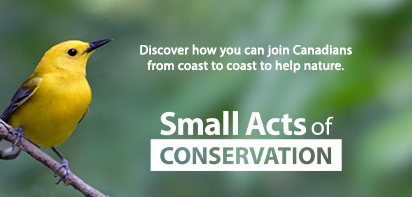Nature Conservancy of Canada celebrates conservation of Beaver Hills property on World Wetlands Day
Conservation agreement created with landowner ensures wetlands and forests remain intact for benefit of all
In a leap toward protecting Alberta’s wetlands, the Nature Conservancy of Canada (NCC) today proudly announced the successful conservation of Moose Pasture, a 65-hectare property located about 40 kilometres northeast of Edmonton. This achievement stems from a new conservation agreement between the property owner, Heather Proctor, and NCC.
Situated just east of Elk Island National Park, within the Beaver Hills, Moose Pasture features mature forests and extensive wetlands. The property's intact habitats and proximity to protected lands make it a high conservation priority.
Proctor, a University of Alberta biology professor specializing in the study of mites, donated the conservation agreement value to NCC. Proctor treasures Moose Pasture for its diverse habitats, which make it an ideal location for biodiversity studies. The property's conservation aligns with Proctor's commitment to maintaining the natural state of the land in perpetuity.
The wetlands on Moose Pasture deliver many benefits to both the environment and the community. Functioning as natural filters, they trap and remove pollutants, contributing to improved water quality. Acting as natural sponges, wetlands also lessen the risk of downstream flooding by regulating the flow of water. In addition, these wetlands serve as crucial carbon sinks, storing significant amounts of carbon and assisting in lessening the impacts of climate change. The property’s wetlands also provide habitat for wildlife, including at-risk species, such as horned grebe (special concern), western toad (special concern) and yellow rail (special concern).
The urgency of conserving Moose Pasture is underscored by the extensive loss of wetlands in Alberta. It is estimated that about 64 per cent of wetlands within the settled area of the province have been lost or impacted.
NCC has been actively involved in the Beaver Hills region since 2002, having conserved over 1,500 hectares to date. The "Keep the Beaver Hills Wild" campaign, launched in 2017, aims to expand the network of conserved lands by collaborating with landowners and local communities. This effort contributes to the broader conservation history of the Beaver Hills, which was recognized as a UNESCO Biosphere Reserve in 2016.
Protecting Moose Pasture contributes to the broader conservation initiatives in the Beaver Hills area, complementing other protected areas such as Elk Island National Park, Cooking Lake-Blackfoot Provincial Recreation Area, Ministik Lake Game Bird Sanctuary, Miquelon Lake Provincial Park and the Beaverhill Lake Heritage Rangeland Natural Area.
This project was supported by the Government of Canada’s Ecological Gifts Program, which provides significant tax benefits for individuals or corporations who donate ecologically sensitive land. NCC’s work in the Beaver Hills is supported by Enbridge Inc.
Quotes
“In the early 2000s, I witnessed rapid development in the Edmonton area, with farmland and woodland disappearing before my eyes. Feeling a need to take action, I searched for ecologically important land to preserve. By partnering with NCC, I now feel it is secure; it's like life insurance for this property. I know that no matter what, it will still be protected, and that is a great feeling.”– Heather Proctor, landowner
"Projects like Moose Pasture exemplify the power of conservation agreements in formally safeguarding important habitats such as wetlands that are held dear by landowners like Heather Proctor. These initiatives not only secure the ecological benefits nature provides but also showcase our commitment towards conserving our shared natural heritage for generations to come." – Tom Lynch-Staunton, Regional Vice-President, Nature Conservancy of Canada
“By collaborating with partners like the Nature Conservancy of Canada, we are working to protect wetlands in Alberta and improve the resilience of these valuable ecosystems while increasing their ability to capture and store carbon. As we celebrate World Wetlands Day, and through programs like the Ecological Gifts Program, the Government of Canada is making progress toward its goal of conserving 30 percent of land and water in Canada by 2030.” – The Honourable Steven Guilbeault, Minister of Environment and Climate Change
Facts
- Heather Proctor will remain the owner of Moose Pasture. Learn more about conservation agreements in Alberta.
- Open water and riparian areas make up almost 40 per cent of Moose Pasture.
- The project falls within the Buffer Area of the Beaver Hills Biosphere Reserve, one of 19 UNESCO biosphere reserves in Canada.
- The Wetland Atlas of Alberta is a great resource for understanding the distribution of wetlands in the province, the biodiversity they contain and the threats they face.
About
The Nature Conservancy of Canada (NCC) is the country’s unifying force for nature. NCC seeks solutions to the twin crises of rapid biodiversity loss and climate change through large-scale, permanent land conservation. As a trusted partner, NCC works with people, communities, businesses and government to protect and care for our country’s most important natural areas. Since 1962, NCC has brought Canadians together to conserve and restore more than 15 million hectares. To learn more, visit natureconservancy.ca.
To learn more about the Ecological Gifts Program, please visit: https://www.canada.ca/ecological-gifts.
Learn More
Follow us on on X (formerly Twitter): x.com/NCC_CNC | x.com/NCC_CNCMedia
Find us on Facebook
- 30 -




